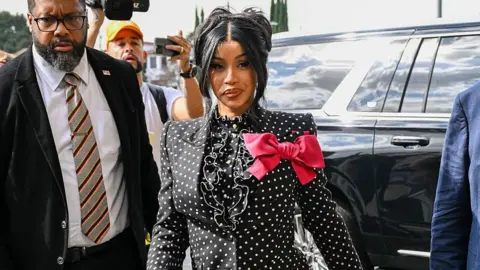In a dramatic turn of events, Conor McGregor, once hailed as Ireland's iconic athlete, has witnessed a rapid decline in public support following a jury verdict that declared him guilty of sexual assault. The Dublin court's decision has irrevocably altered his standing among fans and brands alike, with many removing any association with the fighter, further amplifying the cultural ramifications of the ruling.
The case brought by Nikita Hand, who accused McGregor of raping her at a Dublin hotel in December 2018, culminated in a civil jury awarding her nearly €250,000 in damages. In response, McGregor announced his intention to appeal, but the damage to his reputation was immediate and profound. Retailers in both Ireland and the UK swiftly pulled products tied to McGregor, and brands such as Proximo Spirits declared their intention to discontinue using his name in marketing efforts. The Irish National Wax Museum also removed his wax figure from display, symbolizing a broader repudiation of McGregor’s controversial persona.
Once celebrated as a trailblazer for mixed martial arts and a symbol of Irish pride, his notoriety has recently drawn significant criticism. While he previously inspired many during Ireland’s economic struggles, his various legal troubles—ranging from a 2018 bus incident in New York to physical altercations—have turned public sentiment against him. Commentators have noted that the verdict in Hand’s case marked a seismic shift in how he is viewed locally, once synonymous with Irish identity, now facing rejection.
The fallout from the court ruling even extends to social dynamics within Ireland. Calls to the Dublin Rape Crisis Centre surged by 150% following the verdict announcement, indicating a public awakening regarding issues of sexual assault and victimhood. Many victims expressed both relief and encouragement from Hand’s resolve, prompting broader conversations about gender violence in Irish society, challenging traditional norms on how victims ought to present themselves.
McGregor’s trajectory, from a humble apprentice plumber to a global sporting icon, has often been framed as a rags-to-riches narrative. However, observers note that the enormous wealth and notoriety transformed him—often lost in a world where subservience to fame overshadowed personal accountability. As the dust settles on this latest chapter in his tumultuous career, the future remains uncertain for both McGregor and the sports culture he helped cultivate.
The cultural impact of his legal challenges will likely resonate in the foreseeable future, prompting a reevaluation of celebrity status and the responsibilities that accompany fame. As communities shift away from supporting figures perceived to be morally compromised, the once-celebrated McGregor now stands as a case study on the complexities of accountability in celebrity culture—provoking a collective reconsideration of who we choose to idolize.



















